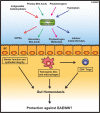The "Gut Feeling": Breaking Down the Role of Gut Microbiome in Multiple Sclerosis - PubMed (original) (raw)
Review
The "Gut Feeling": Breaking Down the Role of Gut Microbiome in Multiple Sclerosis
Samantha N Freedman et al. Neurotherapeutics. 2018 Jan.
Abstract
Multiple sclerosis (MS) is a chronic neuroinflammatory disease of the central nervous system with unknown etiology. Recently, the gut microbiota has emerged as a potential factor in the development of MS, with a number of studies having shown that patients with MS exhibit gut dysbiosis. The gut microbiota helps the host remain healthy by regulating various functions, including food metabolism, energy homeostasis, maintenance of the intestinal barrier, inhibition of colonization by pathogenic organisms, and shaping of both mucosal and systemic immune responses. Alteration of the gut microbiota, and subsequent changes in its metabolic network that perturb this homeostasis, may lead to intestinal and systemic disorders such as MS. Here we discuss the findings of recent MS microbiome studies and potential mechanisms through which gut microbiota can predispose to, or protect against, MS. These findings highlight the need of an improved understanding of the interactions between the microbiota and host for developing therapies based on gut commensals with which to treat MS.
Keywords: Multiple sclerosis (MS); experimental autoimmune encephalomyelitis (EAE); gut microbiome; host–microbe interaction; immune response; microbial metabolism.
Figures
Fig. 1
Schematic of the bacterial metabolic pathways that influence the host immune system. Metabolism of indigestible carbohydrates, primary bile acids, phytoestrogens, and tryptophan by commensal gut bacteria results in production of metabolites such as short-chain fatty acids (SCFAs), secondary bile acids, phytoestrogen metabolites, and indoles/indole derivatives, respectively. These bacterial metabolites exert anti-inflammatory effects on mucosal immune cells, and has been demonstrated in vitro and in vivo. Bacterial metabolites can 1) promote barrier function and epithelial integrity; 2) induce tolerogenic dendritic cells (DCs), which trigger the polarization of CD4+ T cells into interleukin (IL)-10 and/or transforming growth factor (TGF)-β-producing FoxP3+ regulatory T cells (Tregs); and 3) directly induce IL-10 and/or TGF-β producing FoxP3+ Tregs. This tolerogenic intestinal environment may influence the peripheral immune system, and thereby lead to protection against and/or amelioration of experimental autoimmune encephalomyelitis (EAE)/multiple sclerosis (MS). IEC = intestinal epithelial cell
Similar articles
- Lactobacillaceae differentially impact butyrate-producing gut microbiota to drive CNS autoimmunity.
Montgomery TL, Toppen LC, Eckstrom K, Heney ER, Kennedy JJ, Scarborough MJ, Krementsov DN. Montgomery TL, et al. Gut Microbes. 2024 Jan-Dec;16(1):2418415. doi: 10.1080/19490976.2024.2418415. Epub 2024 Oct 27. Gut Microbes. 2024. PMID: 39462277 Free PMC article. - Gut microbiome in multiple sclerosis: The players involved and the roles they play.
Shahi SK, Freedman SN, Mangalam AK. Shahi SK, et al. Gut Microbes. 2017 Nov 2;8(6):607-615. doi: 10.1080/19490976.2017.1349041. Epub 2017 Aug 3. Gut Microbes. 2017. PMID: 28696139 Free PMC article. Review. - Gut Microbiota in Multiple Sclerosis and Experimental Autoimmune Encephalomyelitis: Current Applications and Future Perspectives.
Chu F, Shi M, Lang Y, Shen D, Jin T, Zhu J, Cui L. Chu F, et al. Mediators Inflamm. 2018 Apr 2;2018:8168717. doi: 10.1155/2018/8168717. eCollection 2018. Mediators Inflamm. 2018. PMID: 29805314 Free PMC article. Review. - Interactions between host genetics and gut microbiota determine susceptibility to CNS autoimmunity.
Montgomery TL, Künstner A, Kennedy JJ, Fang Q, Asarian L, Culp-Hill R, D'Alessandro A, Teuscher C, Busch H, Krementsov DN. Montgomery TL, et al. Proc Natl Acad Sci U S A. 2020 Nov 3;117(44):27516-27527. doi: 10.1073/pnas.2002817117. Epub 2020 Oct 19. Proc Natl Acad Sci U S A. 2020. PMID: 33077601 Free PMC article. - Intestinal Dysbiosis and Tryptophan Metabolism in Autoimmunity.
Brown J, Robusto B, Morel L. Brown J, et al. Front Immunol. 2020 Aug 4;11:1741. doi: 10.3389/fimmu.2020.01741. eCollection 2020. Front Immunol. 2020. PMID: 32849620 Free PMC article. Review.
Cited by
- Meta-analysis of the Parkinson's disease gut microbiome suggests alterations linked to intestinal inflammation.
Romano S, Savva GM, Bedarf JR, Charles IG, Hildebrand F, Narbad A. Romano S, et al. NPJ Parkinsons Dis. 2021 Mar 10;7(1):27. doi: 10.1038/s41531-021-00156-z. NPJ Parkinsons Dis. 2021. PMID: 33692356 Free PMC article. - Primary progressive multiple sclerosis in a Russian cohort: relationship with gut bacterial diversity.
Kozhieva M, Naumova N, Alikina T, Boyko A, Vlassov V, Kabilov MR. Kozhieva M, et al. BMC Microbiol. 2019 Dec 30;19(1):309. doi: 10.1186/s12866-019-1685-2. BMC Microbiol. 2019. PMID: 31888483 Free PMC article. - Fatty acids role in multiple sclerosis as "metabokines".
Yu H, Bai S, Hao Y, Guan Y. Yu H, et al. J Neuroinflammation. 2022 Jun 17;19(1):157. doi: 10.1186/s12974-022-02502-1. J Neuroinflammation. 2022. PMID: 35715809 Free PMC article. Review. - The Microbiome and Neurologic Disease: Past and Future of a 2-Way Interaction.
Ochoa-Repáraz J, Kasper LH. Ochoa-Repáraz J, et al. Neurotherapeutics. 2018 Jan;15(1):1-4. doi: 10.1007/s13311-018-0604-9. Neurotherapeutics. 2018. PMID: 29340930 Free PMC article. No abstract available. - What Is Our Understanding of the Influence of Gut Microbiota on the Pathophysiology of Parkinson's Disease?
Hill AE, Wade-Martins R, Burnet PWJ. Hill AE, et al. Front Neurosci. 2021 Aug 26;15:708587. doi: 10.3389/fnins.2021.708587. eCollection 2021. Front Neurosci. 2021. PMID: 34512244 Free PMC article. Review.
References
Publication types
MeSH terms
Substances
LinkOut - more resources
Full Text Sources
Other Literature Sources
Medical
